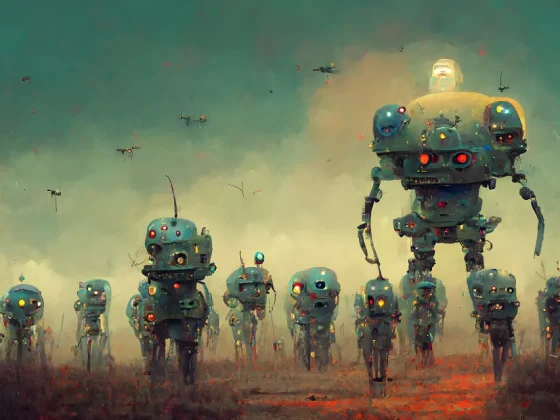By Tessa Lena – Article originally published Tessa Fights Robots.
This story is a fictional fable about human relations and the historical impact of charlatans. I’d like to share it for no particular reason.
Imagine a hypothetical traditional village. In the village, there is a council of elders who have spent decades in pursuing difficult wisdom and genuine spiritual practice (“practice” being the key word, not theory, not sloganeering, but practice that requires clarity, love and courage in their everyday dealings).
The elders have authority for a reason. They are real. They’ve earned it. They know that leadership is really a time-consuming and difficult service that requires humility and giving. They are sincere, and they honor the spirit from a place of love, humility, and knowledge. Are they perfect? No, it’s impossible for a human being to be perfect. But they are sincere in their pursuit of wisdom and in their service.
They are confident but not full of themselves, they rely on the guidance of the real spirit, they are alive and not scholastic. And as far as the general human capacity for understanding the cosmos is concerned, they actually know what they are doing, and also working to raise the young ones to continue the tradition.
But then one day, shows up an opportunist. He wants to take over the village. In his heart, there is envy. He wants the authority but he doesn’t want wisdom.
And so he devises a strategy for a takeover.
At first, he lurks around, peeks, spies, and studies what everyone is saying. He carefully studies quirks, personality features and community dynamics. He then starts coming to the village and pretending to be helpful.
He uses piercing words, and he puts them together with marketing care. He is a wordsmith. He uses what in modern world is known as “neurolinguistic programming.” He calculates what the people want to hear, and he says it.
For extra confusion and persuasion, he even says the same things as the elders—whom he pretends to admire, while at the same time brainstorming regularly at his Opportunists’ Headquarters on how to overthrow them. He knows that the elders can quickly see though him, and that without confusing the people A LOT, he’ll be soon tossed out of the village.
And so, the words he is using are indeed good words. They are very good words, even stunning. Unfortunately he doesn’t mean them and uses them not for healing but as a weapon, for “fogging,” distraction, and bond-building.
He tries every trick on the book. He pretends to be everyone’s best friend and flatters them in private. He tells every important elder in the village that they are surely the best elder, the wisest. At that point, the elders start seeing through the opportunist. They feel disgusted. But they also know that free will is important, and that the opportunist is a test for the people.
Meanwhile, the opportunist doubles down. He reaches out to everyone privately and builds “intimacy” with anyone who listens, boosting their egos, while subtly breeding discontent and promoting bad habits.
“Look at that elder,” he whispers to a particular villager. “I know you trust him but do you really trust him? Is he trustworthy? And isn’t it true that his house is a little more pretty than your house? Look, YOU could be in that house, YOU could be the elder! I know you are thinking that yourself. I know you are, I can see it in your eyes. So, free your words. Say what you feel. I give you the permission. This is what YOU feel, and you deserve to be heard by other people in the village!!”
And so, inspired by this new “love,” the villager betrays his peers, abandons the community rules, imagines himself as a king of the new world, and starts investing in his feeling of resentment instead of keeping his eyes on doing what’s right by the spirit, and solving all things together with those who are genuinely on his side.
And so the opportunist goes from house to house, poisoning the psyche, trying to knock people off their good senses.
How does this tale ends, you wonder?
The paradoxical aspect of the fable is that the success of the opportunist really depends on the people, on how developed their senses are, on how strong the community is, on how willing the people are to reject the invite to cultivate their bad habits (that all people have without a doubt), on the clarity of their vision.
And if the people go for the sorcery of lying, and rise up for their right to cut corners and celebrate their bad habits, and dislodge the elders from their position of power, the elders will not be existentially embarrassed, albeit they will be disgusted and heartbroken by the wobbly spiritual legs and the gullibility of the people.
The village itself, however, will eventually go to scraps without the guiding wisdom.
The new authorities will soon find out for themselves that citizens without wisdom are chaotic and prone to crime, and so they will have to build jails and come up with all sorts of algorithms to control the masses. The poisoning will have to be continuous.
From that point on, the power will be driven strictly by personal gain, and it will be viewed both by the boot wearers and by those underneath the boot not as a service, not as a matter of great responsibility—but a source of personal gain and domination.
And sooner or later, this domination monster will eat everything from horizon to horizon, and life will get so bad that people will get tired of suffering and cry out into the skies, asking for guidance, asking for help to remember their souls and their long forgotten wisdom.
“We can’t live like this any more!!!” they will cry. “Help us!!!!!”
And because the fabric of which the universe is made is love, because the skies have never been waiting for the people to make mistakes, and “punishment” is merely a way a long-abused mind sees the experience of learning important things—help will come after people prove that they mean it, and they are ready to live their lives well.
It may not be easy, and the opportunists will be allowed to show up every now and then to allow for the realization of the most important thing, the free will. But sooner or later, once the people get sufficiently tired of repeatedly making the same mistake, the village will heal, and it will thrive and throb in the mystery of love and healthy human relations. The people will stop being zombies and learn to live as finite vessels of infinite love. And after all this crap, the chance is, they may get wiser—and in the end, the experience of losing their heads temporarily will be an experience of great value, for them and for the future generations.














